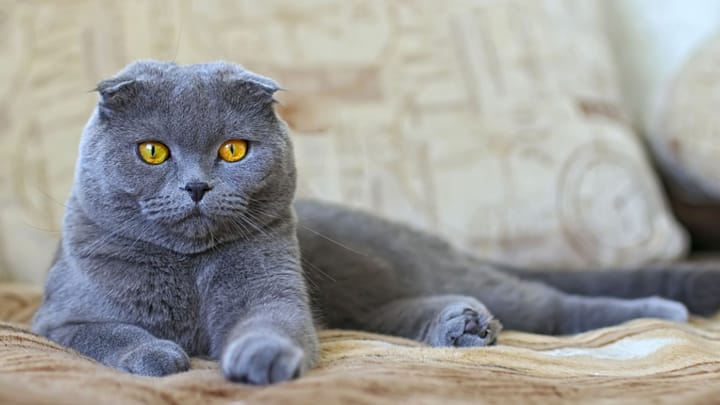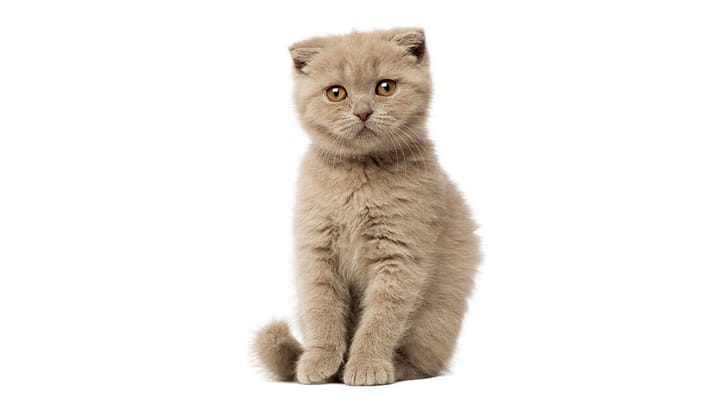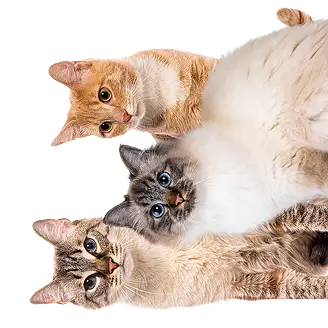Scottish Fold


Originally from Scotland, the Scottish Fold has the unique feature: ears that are folded forward, as a result of a spontaneous genetic mutation - hence their name. Their round body, with soft, thick fur and a rounded head with big, astonished eyes, give this cat the look of a teddy bear.
|
Life expectancy |
The Scottish Fold has a life expectancy of between 12 and 15 years |
|
Temperament |
|
|
Adult size |
Female
Between 12 and 14 in
Male
Between 12 and 14 in
|
|
Adult weight |
Female
Between 7 and 11 lb
Male
Between 9 and 13 lb
|
|
Coat colour
black / seal, blue / slate grey, chocolate, lilac, cinnamon, fawn, red, white, tortoiseshell |
Black Brown White Red Blue |
|
Type of coat
Short |
Long |
|
Eye colour
All colours are recognised as long as they are uniform and match the colour and pattern of the coat. |
Blue
Green
Yellow
|
|
Purchase price |
The Scottish Fold costs between £400 and £1000 |
Kittens of this breed are actually born with straight ears, and the folding develops later on, when they are about three weeks old.
More details about the Scottish Fold
Scottish Fold: Origins and history
The spontaneous mutation of the folded ear (Fd) gene, first appeared in 1961 in a white cat named Susie, who was discovered by William Ross on the McRaes farm in the Tayside area of Scotland. A year later, Susie gave birth to a litter of kittens, two of which had folded ears. William and Mary Ross, who were breeders of British Shorthairs, kept the white female and started a breeding program with the help of a geneticist to try to reproduce the folded-ear phenotype, using British Shorthairs and farm cats. This proved a difficult task for a number of reasons, such as the fact that the fold took three weeks to appear, the articular malformations diagnosed in some individuals, and the deafness that appeared in others and was wrongly attributed to the Fold gene (Fd). This resulted in the non-recognition of the breed in the United Kingdom from 1971. Mary Ross sent several cats to the United States and the breeding of Scottish Folds developed there. The Cat Fanciers' Association (CFA) granted them official breed status in 1978.
Physical characteristics of the Scottish Fold
Medium in size, the Scottish Fold’s body is semi-cobby and rounded with a strong bone structure and powerful musculature, carried by well-muscled legs which are slightly shorter than the length of the body. Their tails are extremely flexible, medium in length, and have a very thick base that tapers towards a rounded end. The head is broad, with rounded contours, a short, wide nose, full cheeks and very full whisker pads. They have large eyes which are spaced out and wide open, giving them a remarkable expressiveness. The ears are small, broad at the base, rounded at the end and bent forward. There is a distinction between two types of fold: the simple fold (ears folded from the middle) and the double fold (ears completely flattened on the head).
Scottish Fold: Characteristics
Scottish Fold: Behaviour
Breed compatibility Scottish Fold
Scottish Fold: Purchase price
The average purchase price of a Scottish Fold is between £400 and £1000, with some variation depending on the lineage, breeding, age or even the sex. For your monthly budget, you should allow an average of £25 per month to meet the cat’s needs, ensuring to give them high-quality food and keep them in good health.
Scottish Fold: Shedding
Heavy !
Their abundant undercoat means they lose a lot more fur during their spring moult.
Scottish Fold: Grooming
The size and the shape of their little folded ears means they must be regularly cleaned by a vet. Their thick, dual coat also requires a deep brush at least once a week, and daily during moulting periods. It is strongly advised that you habituate your cat to these routines from the earliest possible age to avoid any adverse reactions.
Scottish Fold: Health
Their life expectancy is about the average for most cats, between 12 and 15 years.
These cats are relatively sturdy and don’t have any problem withstanding low winter temperatures. However, their extremely thick fur makes them fairly sensitive to heat.
Their heavy layer of fur can easily hide a little chubbiness, so be sure to keep an eye on their weight, regulate their food intake and offer them activities to ensure they use up all their energy.
- Osteochondrodysplasia: a disorder arising from endochondral ossification disorders, leading to osteoarticular malformations, particularly affecting the distal limbs and tail, causing stiffness, lameness, paralysis, etc. It is the Folded ear (Fd) gene that is responsible for the condition. All Scottish Folds, whether homozygous (from two Fold parents) or heterozygous (from a Fold parent and a straight-eared parent) are affected by this disease - the only thing still in question is the degree of severity of the lesions in heterozygous subjects. It is essential to ensure regular veterinary check-ups throughout your cat’s life to ensure they don’t suffer from related joint disorders
- Hypertrophic cardiomyopathy: a disease that affects both non-pedigree cats and official breeds, eventually heart failure. There is no genetic test for the Scottish Fold breed, but they can be screened via ultrasound examination, along with a Doppler test.
- Polycystic kidney disease: a disease that causes the kidneys to be invaded by fluid-filled cysts, eventually causing incurable kidney failure. This condition is hereditary in the Persian, and likely to affect other breeds like the British and the Scottish Folds. The disease can be detected by a DNA test or kidney ultrasound.
- Scottish Folds can also develop the same conditions as any other cat, such as oral diseases.
Pairings between Scottish Folds are strictly forbidden due to the osteo-articular malformations caused by their Folded ear (Fd) gene. However, crosses between Scottish Fold and Scottish Straight (straight ears), British Shorthair and American Shorthair are allowed.
Do you want a Scottish Fold cat ?
Frequently asked questions
How much does a Scottish Fold cat cost?
The average price for a Scottish Fold is between £400 and £1000. This price depends on the lineage, breeding, age or even the sex.
How long do Scottish Folds live?
The life expectancy of a Scottish Fold is between 12 and 15 years.
Do Scottish folds like to cuddle?
Yes, Scottish Fold cat will love to cuddle as they are extremely affectionate. They will actually always be demanding for more and more cuddles. They have a facial expression that’s always coaxing their favourite human to come cuddle and play with them.
What is the friendliest cat breed?
The Scottish Fold is definitely one of the friendliest cat breeds. Indeed, they love to cuddle, get along with other dogs, cats, children and strangers. Not only will they love to play, but they'll also enjoy a napping session with whomever is around.
Find out a list of the 10 most friendliest cat breeds.
Can Scottish folds be left alone?
The Scottish Fold is a very sociable cat and doesn't like it so much if he's left alone for too long. If you managed to keep him entertained for a few hours while you're away it should be fine, but if the Scottish Fold is left for long periods of time, he won't like that.
Find out more about how long you can leave a cat on its own for.






